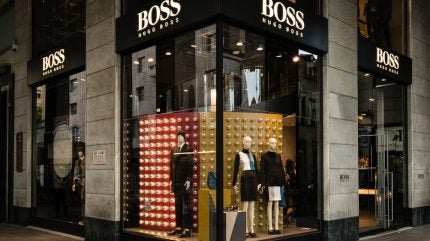
Hugo Boss confimed sales fell 1% in the second quarter (Q2) but did increase 3% in the first half.
Brick and mortar wholesale increased 5% in Q2 and 7% in H1. Its online arm saw a 3% increase in sales in H1 and in Q2. Brick-and-mortar retail revenues were flat in H1 but down 2% in Q2.
Hugo Boss blamed overall market uncertainty and high operating expenses for weighing on earnings growth. Earnings came in at €139m ($150.40m) for H1 and €70m for Q2.
Going forward, Hugo Boss said it expects bottom line performance to acceleate in H2 due to increased focus on driving cost efficiency; full-year EBIT forecast to come in between €350m and €430m.
It is implementing several cost measures to support profitability going forward.
Hugo Boss CEO Daniel Grieder said while over the past three years, the group’s Claim 5 strategy enabled it to deliver superior top-line growth through stepping up investment into products and brands and boosting relevance, a deterioration in the global market led to a demand slowdown across the industry.
He explained: “And while the macro environment is likely to remain difficult for the time being, we are steadfast in our commitment to continue driving above-trend growth, capturing further market share, and focusing even more on operational and organisational productivity.”
He added the group will continue to focus on customer engagement and strengthening customer loyalty to ensure the long-term success of its brands Boss and Hugo.
“At the same time, we adapt to the current market environment and accelerate our cost discipline from here on. This includes leveraging our global sourcing activities, which have already translated into solid gross margin improvements in the first half of 2024. We have also taken additional measures to enhance efficiency and effectiveness across our business, capitalising on our robust organisational platform built in recent years. This includes removing spend in non-strategic areas of the business, with particular emphasis on sales, marketing, and administration. Together, these efforts will enable us to noticeably limit cost growth going forward and provide strong tailwind to our bottom-line performance, starting in the second half of this year already. In doing so, we will ensure that we emerge even stronger once the global market environment returns to normal. At Hugo Boss, we remain committed to driving sustainable, profitable growth and creating significant value for our shareholders.”
Commenting on the numbers GlobalData senior apparel analyst Pippa Stephens said it was the first sales decline for Hugo Boss since the pandemic and “a notable downturn from the growth of 4.8% it experienced in Q1 as it belatedly feels the impact of the challenging economic environment in its key markets”
On operating profit she noted: “Hugo Boss does foresee improvements in this in H2 thanks to cost efficiencies, expecting it to land between €350 to €430m, which would be between a decline of 15% and a rise of 5% on the year.”
“Though growth was muted across all markets, the Americas performed most strongly in Q2 FY2024, with currency-adjusted sales rising by 5%, as its high quality, premium offering continues to resonate with consumers in the region. EMEA saw revenue fall by 2%, as shoppers’ finances remain squeezed due to high inflation, with the UK one of its poorest performing regions, as it faces some of the greatest economic challenges. While Hugo Boss also experienced a slowdown in other major countries like France and Germany, emerging markets in EMEA saw double-digit growth, owing to their developing economies and the group being less established there. Asia Pacific saw the greatest decline of 4%, however, this was primarily dragged down by China, where consumers have been cutting back their spending amid the debt crisis in the property sector. In contrast, Southeast Asia and the Pacific were much more positive, with sales rising by high-single digits.
“The brand is focussing on initiatives to drive momentum in the remainder of the year, partnering with David Beckham on a multi-year design collaboration as well as a campaign alongside Naomi Campbell launching at the end of August. This should help to boost visibility of Boss and bring it back to the forefront of consumers’ minds.”



